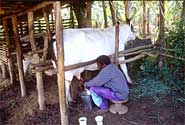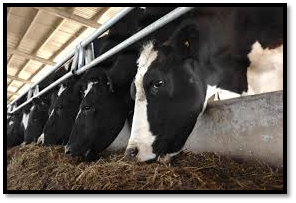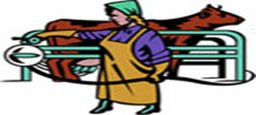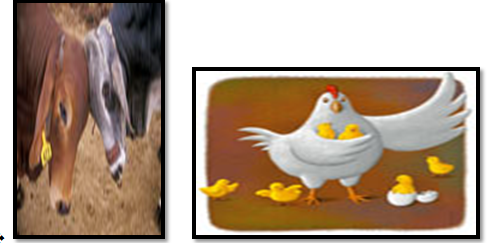Authors: A.S.Gawali*, S.A.Belge, P.T.Yeole
Email :a.s.gawali@kkwagh.edu.in
(Assistant Professor, K. K.Wagh College of Agricultural biotechnology, Nashik.)
Summary:
Farm managers are employed to manage and carry out duties associated with the day-to-day and long-term management of large commercial farms. It is their responsibility to ensure that the farm runs efficiently and profitably. Their day-to-day activities will depend on the type of farm being managed:
• Livestock (animals)
• Mixed (animals and crops).
Work activities
• Planning the running of the farm
• Setting budgets and production targets
• Buying and selling animals or produce
• Keeping records of livestock and/or crops and financial records
• Recruiting, training and supervising staff
• On smaller farms, doing practical work such as looking after livestock, driving tractors and other machinery, spreading fertiliser and harvesting crops.
- PLANNING
An advance plan requires for four pillars of successful animal enterprise viz: breeding, feeding, management ,disease control & marketing needs to be drawn.
a) Purchase of animal
1) Before purchasing the animal planning is required for ‘Breed Selection’ & ‘ Requirements of animals’ ( for milk production or for breeding purpose).
2) Quantity of purchase of animals depends upon availability of space, labors, capital etc.
b) FEEDING
- In planning of feeding following points to be consider:-
- 1. Cultivation of green fodder crop to supply green fodder to the animals throughout the year.
- 2. Preservation of surplus forage.
- 3.Procurement & storage of concentrate & other feed materials.
c) BREEDING Future of enterprise totally depends on the breeding planning of animals which includes :- Both female & male selected for breeding should be superior in characters such as high milk production, fat %, disease resistance, and resistance to adverse climatic condition, etc. Which should be heritable to their offspring which is a member of next generation in the farm herd.
d) MANAGEMENT & DISEASE CONTROL
- For control of diseases following planning is necessary :-
- Good housing with enough ventilation & sunlight.
- Disinfection of houses is done regularly by using 1 to 2% phenol solution.
- Provision of easy digestible & nutritious food, clean water.
- Separate attendant, housing, feeding, watering etc. should be provided for diseased & healthy animals.
- Personal vaccination against common infectious diseases.
- After death of diseased animals burry it deep with lime.
e) MARKETING
- For getting optimum price of main produce & by produce in marketing planning is necessary:-
- Main produce milk ; well developed ‘Bull’ for farm work.
- By produce well decomposed cow dung ( F.Y.M.), culled animals .
-
ORGANIZING
It is the managers concern to know the norms & quantum of unit of work that a laborer is expected to finished in certain unit of time, on this basis work has to be assigned, a practical man know this more precisely . The manager should probe, the psyche of his subordinates deeply to find out their temperature & aptitudes so that he can allot to each person the type of work he likes .
DIRECTION
- Direction of manager to his labours should be specific & simple .
- A good manager does not do much of bossing, he delegate some of his power to his coordinates .
- Manager should supervises & inspires his coordinates. It some one has done a good job .
- It someone has failed before firing him the manager should find out how he has failed .
-
COORDINATION & CONTROL
- Many problems can be solved easily if manager keeps good communication between him & staff co working with him .
- Any bad worker or non cooperative link can put entire operation out of gear .
- Coordination should be achieved among all the workers of the enterprise working in different section like feeding feed supply, milk & milk handling , breeding operation, calf care, disease control etc. by the manager .
-
KEEPING RECORDS
- Like a road map, a good record tells you where you are going in your business.
- Only with accurate records can the animal or manger judge his production, keep an account of the amount feed consumed for production & determine whether his production is profitable or not .
- It also provide adequate information for breeding & genetic improvement of stock .
- Kinds of records kept :- 1. Farm diary 2. Breeding records 3. Production records 4. Feeding records 5. Labour records 6. Health records 7. Pedigree & herd records 8. Complete enterprise record
OWNER MANAGER
- Own manager should have necessary skill & technical knowledge .
- He should consider following points before appointing himself as a manager . 1. Does he possess necessary technical knowledge training ? 2. Has be sufficient knowledge of accountancy & book keeping ? 3. Is he having sufficient experience with fuel operated machine etc. It is very relevant to remember that, “ Enterprise never fails, It is the man in manager who fails .”
PRINCIPLES OF FARM MANAGEMENT
- Definition of management :- “ Management is an art & science combining ideas, facilities, processing materials & labour to produce market worthwhile product successfully .”
- Principles of farm management :- 1.Principles of Breeding 2. Principles of Feeding 3. Principles of Heeding 4.Principles of weeding
PRINCIPLES OF BREEDING :
- Both male & female selected for breeding should be with superior genetic material.
- Breeding of farm animals involves following steps:-
- Evaluation of their production potential.
- Selection of suitable individuals ( both male & female ).
- Mating them in planned manner.
- Economic traits in the farm animals like milk production , gaining in body weight carcass quality are controlled by large number of gene i.e. polygene. ( polygene have small effect individually but their overall action is great.)
- To develop superior progeny for next generation , it is necessary to select genetically superior parent & their mating at proper time when both are capable of fertilization.
PRINCIPELS OF FEEDING :
- Scientific feeding is an important factor in successful livestock forming, assist account 70% expenses of the total cost of maintenance.
- Animal should be fed with balanced ration for exploiting their genetic potential to tallest extent.
- Ration should provide nutrients for maintenance of body & production of milk , meat etc.
- Nutrient requirement is worked out in term of DCP & TDN. which is provided through roughages & concentrates & dry matter requirement should be calculated @ 2.5-3.5% of body weight to satisfy the hunger of animals.
PRINCIPLES OF HEEDING :
- HEEDING :- “ Heeding means keeping the animal comfortable by providing good health .”
- HEALTH :- “According to definition of WHO health is state of complete physical , mental , & social well being .”
- For maintenance of health :-
- Provide proper management , housing & hygienic condition.
- Protect animal from harsh environmental condition.
- For proper heeding of animal livestock owner should get against with the modern methods of care & management of animals both in health & diseases.
PRINCIPLES OF WEEDING :
- WEEDING :- “ Weeding is defined as culling ( disposal ) of uneconomic animals through castration so that they are prevented form reproducing.”
- Reasons of removal of cows percentage from herds
- Low production 33.49%
- Dairy purpose 23.39%
- Udder trouble 11.47%
- Sterility 08.26%
- Abortions 07.34%
- Death 05.04%
- Old age 02.7%
- Other causes 08.26%
About Author / Additional Info:
I am currently working as Asssistant professor at KKwagh college of agril biotech, Sarswatinagar, Nashik